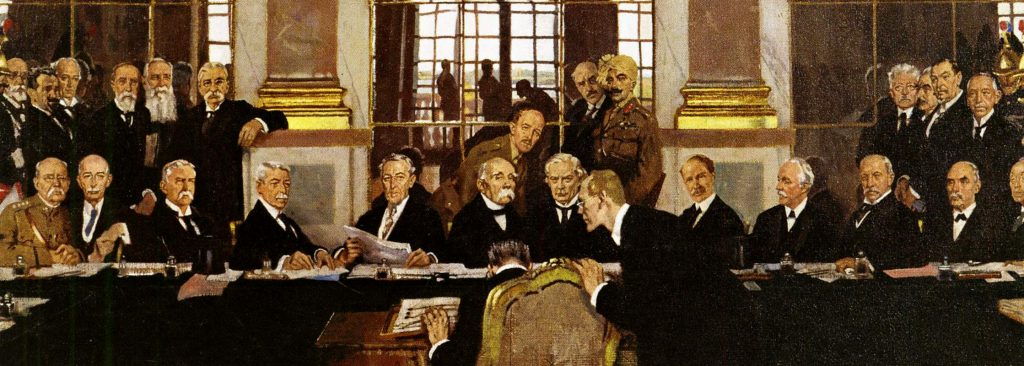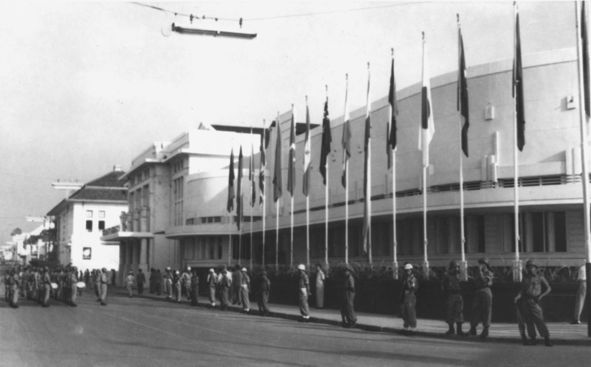Following World War II, a large part of the world was in the hands of European powers, established as colonies in the previous centuries. As one of the nations that came out on top of the geo-political situation, the United States was looked to with hope by aspiring nationalist movements, but also seen as a potential source by European allies in the war as a potential supporter of the move to restore the tarnished empires to their former glory. What’s a newly emerged world power to do?
Guest R. Joseph Parrott takes a look at the indecisive position the United States took on decolonization after helping liberate Europe from the threat of enslavement to fascism.
Guests
 R. Joseph ParrottAssistant Professor of History, the Ohio State University
R. Joseph ParrottAssistant Professor of History, the Ohio State University
Hosts
 Joan NeubergerProfessor of History, University of Texas at Austin
Joan NeubergerProfessor of History, University of Texas at Austin
If you could start with a definition of decolonization: what it was and what period we’re going to be talking about?
Decolonization is essentially any process where one state is moving from being a colony within a formal empire to national independence. And we use it mainly to talk about the end of Europe’s modern continent expanding, imperial system. This a process that began with the United States gaining independence in the 18th century, but when historians and most people talk about it, they’re talking about the era of decolonization, which is the period after the Second World War, when local nationalist movements forced various European empires to leave Asia, Africa, and the Middle East.

So we’re going to talk today about the role of the United States in that post-World War II process. And the United States has a kind of ambiguous position, right? It’s sometimes associated with resistance to European imperialism, but wasn’t it an empire at the same time?
Yes, it really was. And it comes down to how you define the idea of empire. But everyone can agree that the United States has wanted to expand ever since it first became a nation. And it first started in the North American west and then on into Hawaii, Puerto Rico, Pacific territories like the Philippines. The United States has always acted as an empire in this tendency to annex new territories and peoples. But it’s also tried to set itself apart in this kind of classic example of European colonial imperialism. It did so by integrating new states into the country, as it did with Hawaii and these western territories, or establishing a finite period of occupation, as was done with the Philippines, which we left in 1946. So there’s always been a tension between this tradition of democratic anti-colonialism that we inherited from the Revolution and the search for power. And we see that today. We still have American territories and we have many of these military instillations over seas that many people talk about as an empire.
So how did this ambiguous situation affect the way that colonialism and decolonization were viewed in the United States?
Since the Revolution, the American people—the popular idea—has always been against empires, especially this idea of having formal colonies. And there’s always been sympathy with this idea of people struggling for freedom against oppressive colonial foreign governments. Although it’s worth remembering what constituted oppression was defined in many ways by issues of race, of civilization, these other kind of cultural ideas. And in the twentieth century there were academics, there were politicians like Franklin Roosevelt who loved reminding the world that the United States was the first post-colonial nation, the first revolutionary anti-colonial nation. And so it’s true that we find opposition to empire popping up repeatedly throughout American history, in the Monroe doctrine for instance and its guarantee against European influence in the Western hemisphere and also the refusal to annex Cuba after the Spanish-American war.
Let’s talk about the Monroe Doctrine for a second. Don’t many historians view it not as anti-imperialist, but as protecting American interests from competition with European empires in the Western hemisphere?
Yes, that’s right. The Monroe Doctrine is this fantastic example of the tension between empire and anti-colonialism in the United States. The popular view of the Monroe Doctrine is that the United States was protecting the western hemisphere from European imperialism, this re-colonization. But officials were really interested in protecting US interests in Latin America, which was sort of our sphere of influence. And the United States was arguing against the establishment of formal colonies because we wanted to retain access to these nations politically and economically in Latin America. The United States was especially protective of areas like the Caribbean because we had strong economic ties, there was this close geo-strategic proximity. Essentially what we were doing was establishing an informal type of empire in the region where we had an outside influence on domestic and economic affairs, but we did not directly colonize them the way the Europeans were doing.
Let’s move back to Europe’s colonies in Africa and Asia, outside the western hemisphere. How did the US view Europe’s empires, which were still expanding as late as the early twentieth century?
Outside of these kinds of areas of specific interest, like the Caribbean, like the Pacific trade bloc that we were trying to create, the US essentially minded its own business. Now we look at empires as these things of the past, these historic relics, but at the time it was just an accepted part of the international system. And so in the Pacific, where these empires were scrambling trying to get colonies, the US was only interested in keeping only what was called then an “open door” to the markets of big places like China. What we essentially wanted to say was that no one colonize here, we keep these open trading blocs, and we can go about our economic competition on fair ground. And if you want to colonize these areas that we’re not concerned about (Burma, Africa) that’s fine, we don’t need to worry about it. And this was the general reaction, with a few exceptions. If anyone’s read King Leopold’s Ghost, you know the use of forced labor became a big, international issue. Mark Twain was writing about it, American missionaries were writing about it, and objecting to it. But this was more a popular humanitarian crusade, not necessarily an official condemnation of imperialism, which the United States was not willing to do at the time.

So we were most interested in having the freedom to have economic relations with other countries with colonies rather than political control. And when did this kind of political hands-off attitude begin to change?
The first glimmerings were with Woodrow Wilson and his talk of national self-determination after World War I at the Versailles Conference. But Wilson applied this mainly to Eastern Europe, and he was quite surprised when people in places in Vietnam—Indo-China at the time—and India tried to use this rhetoric to claim independence. Franklin Roosevelt was really the first American president to hold a truly critical view of empires. Roosevelt came out of this Wilsonian tradition, but he understood that the big historic implications of rising nationalism in Asia, Africa, and Latin America as an extension of the American revolutionary spirit from the 1770s. And Mahatma Gandhi and Indian nationalist received global attention in the 1930s for their peaceful protest against British rule. And it seemed that this colony in particular was inching towards independence. Roosevelt recognized that this was a start of a global movement and he wanted to have the United States on the right side of history when things played out. So he started trying to make maneuvers, but he wasn’t really interested during the Great Depression in trying to push anything—so it was more rhetorical at this point. But in the Western Hemisphere, where the United States had control, he implemented the Good Neighbor policy in 1933, for instance, which was meant to build cooperative relationships with Latin American countries that the US had traditionally treated as part of its informal empire.
So World War II had a big influence on opposition to European colonialism. What was the influence of the war?
The war had two effects. The first was that it seriously disrupted the Dutch-French-British-Belgian colonial systems. In Asia, Japanese invasions of European colonies like Vietnam, like the British in Burma, illustrated to local peoples that Europeans were not invincible. The war also changed relationships between Europe and its empires, even in places where the Germans and Japanese didn’t invade. Colonial peoples played an important role fighting in British and French armies. And African cities like Brazzaville and Algiers even served as the first exile capitals of free France. And the European empires mobilized these troops, mobilized this support with the vague promise of greater freedom and self-government after the war. And when the war finally ended colonial peoples expected these promise to be honored and they started looking for changes in imperial policy
That was the first effect. What was the second major effect of World War II?
The second effect was the United States emerged as the preeminent power. Occupation, bombing, fighting: all these things seriously disrupted the European economies. While the war expenditures actually helped jumpstart American industry after the Great Depression. So when the war ended Europeans found themselves weak and dependent on a United States that had traditionally been ambivalent about their colonial empires.
Europeans wanted the United States to help rebuild their domestic economies but also to help rebuild their empires. Was the US willing to fund the rebuilding of European imperialism?
The US was very ambivalent about this issue. And they recognized that Africans and Asians were expecting greater freedom. They recognized that and they understood. But the US was partly to blame for this issue. In 1941, Roosevelt and British Prime minister Churchill had signed the Atlantic Charter, and this became the foundational document of the Western alliance as it fought against the Axis powers. And there were a number of key principles, but among them were freer trade, no territorial acquisition, and the restoration of self-government to those deprived of it.
So the Atlantic Charter had a big anti-imperial piece to it. Did Roosevelt see this 1941 Atlantic Charter as an anti-colonial document or was it more like the kind of ambivalence we see with Wilson after World War I?
Well there was certainly an anti-colonial subtext, but Roosevelt didn’t necessarily see everything in the Atlantic Charter applying to Africa and Asia. But he really understood the power of nationalism and he felt that decolonization was inevitable. So this was kind of the first step in pushing the British to reevaluate what they were doing. And he said at one point to Churchill in 1941, and I’m quoting here, “I can’t believe we can fight aware against fascist slavery and at the same time not work to free people all over the world in a backward colonial policy.” And so this was Roosevelt’s attitude, he felt it sincerely, but he was more than happy to delay haggling over European empires until after the war so that we could actually win the war before we had to sort out these issues between allies.
After World War II ended, did the US push its allies to free their colonies in any way?
Roosevelt wanted to. He was a bit hesitant to force the hand, especially because the British and the French were working together. But when he died, he seemed to be moving toward applying some level of pressure. And among other things, the United Nations featured a committee that was specifically concerned with trusteeship territories like Palestine and non-self-governing territories, which was essentially meaning the colonies. And the US was keen to see the British leave India, since it believed that at the time the country was prepared to govern itself with the Indian National Congress, and would challenge any British attempt to stay in the future. And this pressure likely played a small role in how the United Kingdom looked at India and its decision to grant independence in 1947.
But there was less confidence in the ability of other colonies to govern themselves, especially in Africa. So the French, the Belgians, the Portuguese, none of them had allowed serious participation by colonial peoples in the government. So most American officials believed—importing some of these racialized notions that they inherited—that non-white peoples were politically immature, backwards. And so if they didn’t have this experience in colonial government they wouldn’t necessarily be able to take over. So the United States was trying to avoid this premature decolonization. They were talking very vaguely about decolonization in the future, as something to start thinking about, if not actually enacting it.
So the US was taking its time, trying not to get too involved in pushing decolonization, but then tensions between the US and the USSR really changed the geo-political situation around the world. How did it affect the imperial situation at the end of World War II?
Amid these rising tensions with Soviet officials, Washington officials began to fear that any unrest, any economic suffering could lead Soviet-led communists to take over new countries to gain power. This led Harry Truman, taking over after Roosevelt, to value order and stability across the globe, but specifically in Europe where economic and political recovery was key. This is where Soviet expansion was the most dangerous. And the European allies claimed that they needed a colonial markets, colonial resources, to help restart their industry. And so Truman obliged them, at least in the short term. The United States dropped pretty much all its reservations about Europe restoring its empires, both because it wanted to avoid potential disruptions at the periphery—
—At the periphery of Europe you mean?
At the periphery of Europe, yes. So places like Africa and Asia. But it really wanted its European allies to be able to begin using the colonies, and thereby stifling the growth of domestic growth of communism in Europe.
There are a lot of contradictions in US policy during this period. On the one hand, a history of its own imperialism, a policy of anti-colonialism during World War II, and now turning back to support for European empires as a Cold War tactic? Is that right?
Yup. Essentially, these contradictions were especially pronounced in this post-war period because the United States represented the Cold War as this fight between the free world and Soviet totalitarianism. And the US built the Western alliance on ideals of capitalism, democracy, free trade, all these things that were kind of antithetical to the traditional idea of empire. But at the same time the North Atlantic Treaty Organization, NATO, included a number of European empires, and even an imperial dictatorship in Portugal. So the rhetoric conflicted with the realities of power politics, much as it had earlier in American history. So throughout the 1950s, nationalists from various African and Asian colonies are coming to the United States, they’re asking for help, and they’re not really getting any concrete aide. And these contradictions were acknowledged by an official from Dwight Eisenhower’s administration. And he says, and I’m going to quote here again because it’s a fantastic quote, “Our instinctive anti-colonial feelings, and playing ball with our colonial allies, have made US policy,” quote, “contradictory, confusing, and at times almost irresponsible.”

So it was acknowledged within the administration. What was US policy doing about these contradictions?
Honestly, it wasn’t doing too much. Because this was a balancing act. And when you were trying to balance these competing interests, it usually came down on the side of the Europeans, these hard geo-strategic Cold War interests. And as the earlier quote showed, the Eisenhower administration recognized that this policy was not winning allies outside of Europe. And it was in 1955, during the administration, that the Afro-Asian nations gathered together at Bandung to start the non-aligned movement, forging their own identity between these American and Soviet ideas. And so Washington officials felt supporting decolonization was the best way to make sure that these new nations, instead of going on their own way or joining the communists, would stay friendly to the West. So, like Roosevelt, Eisenhower started quietly urging European allies to start increasing participation in politics, consider long-term transfers of power that would safeguard European economic and cultural ties. And this last part is really important because the US wanted its friends to retain this international influence, but this seemed impossible if the Europeans insisted on direct political control when the people on the ground didn’t want it. So overall the US was not willing to force its allies to act, but they were hinting at these ideas. But when countries like France and Portugal refused to budge, Eisenhower and his successors essentially took a step back and sided with their NATO allies.
What were nationalists in Africa and Asian colonies doing to achieve decolonization, to fight against the American and European power politics?
Well there were two main strategies. After they weren’t able to get the diplomatic support, and while they were trying to get diplomatic support, there was this idea of peaceful protest and political negotiation. This was the first idea. It was essentially the Indian model. It was popular in the British sphere, but used with some results elsewhere. And while this approach did not always work, nationalists had to find new ideas so they turned to raising the cost of empire, actively fighting for independence until the metropolis, until these European nations were forced to finally leave because it was too expensive to stay in the colonies fighting for control. And this is what happened in Algeria with the French, it’s what happened in the Portuguese colonies in Africa, Mozambique and Angola, but rebellions in British Kenya and Malaysia also influenced calculations as well. So it’s not just a Latin group versus and Anglo-Saxon group—it’s nothing like that. It’s everybody facing these ideas of political negotiation and also fighting when that breaks down. And when they were fighting these wars, the nationalists were saying this is essentially a fight for freedom, a fight for self-determination, a fight for human rights. And this was very appealing to South Americans, to Africans, to Asians, but it also influenced Europeans and Americans, who were adopting increasingly negative attitudes towards this idea of empire. And it was this combination of local agitation and shifting international opinions that ended the formal imperialism. So by 1958, most of Asia was independent, in 1960 there were many new African nations that were independent. And this finally ended in 1975, with the freeing independence of Portuguese colonies and free elections in Zimbabwe in 1980.
Overall what can we say about the US role in decolonization?
Essentially it was ambiguous. The Cold War led successive administrations to support European empires even though we suspected that they were bound to fail in the long run. The United States also pioneered anti-colonial rhetoric, which peoples in European colonies used to justify a major rupture in human history, that effectively ended formal imperialism on a global scale. Ho Chi Min after all quoted Thomas Jefferson when he first declared independence for Vietnam in 1945. So when decolonization occurred peacefully, often it was because nationalists were able to use the rhetoric of self-determination, popularized by the US to cajole European states into recognizing their rights. And when nationalists had to fight for freedom, the appealed to communist states who wanted to highlight the hypocrisy of the Western alliance in its inability to support fully decolonization. So in essence the United States provided diplomatic and financial aide to European imperialists, but it also helped create and international context that empowered anti-colonial nationalists rhetorically, politically, and materially.
And have there been any lasting effects of this American approach in the former colonial areas after they achieved independence?
Definitely. I think our policy of promoting stable, Western-friendly countries often backfired. Cold War considerations made it easy to support repressive governments that opposed communism but that didn’t necessarily represent their people very well. We did this first with the colonial powers, but continued to do it in the post-independence phase with countries like South Vietnam and Sudan. And the result in many cases was civil war, poor governments, struggling economies, and resentful populations. And second, international appeals for support during decolonization created a problematic precedent that continued after independence. If you were having a disagreement on the ground it was very easy to appeal to a world power to come in and support you, and the imperialists did this first, but so did the post-colonial nations. And the result was a number of Cold War proxy wars that fueled decades of civil war in places like Angola.
So looking at decolonization from today’s perspective, what was the legacy both for the US and for postcolonial countries?
So most Americans don’t really think about decolonization. It’s over in the margins, away from our primary interests, away from our primary news coverage. But postcolonial countries don’t see themselves as marginal and they understand what the United States was doing in the world. And so for many foreign peoples, decolonization was in their lifetimes or within their parents’ lifetimes, and so they’re using it as they’re trying to interpret what American actions mean in their countries and in their regions. So government leaders are using this history to try and figure out if the United States is being contradictory or irresponsible again as they had been in the past. So it’s important for us to remember these histories when we’re considering how American actions are perceived and interpreted internationally.